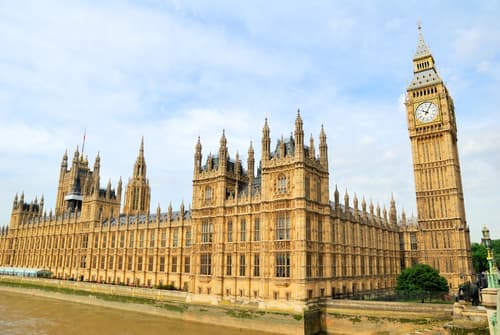Myths about teaching can hold you back
- Year 8
What is the difference between the Government and Parliament?
I can describe the key differences between parliament and government and explain some of their roles.
- Year 8
What is the difference between the Government and Parliament?
I can describe the key differences between parliament and government and explain some of their roles.
These resources were made for remote use during the pandemic, not classroom teaching.
Switch to our new teaching resources now - designed by teachers and leading subject experts, and tested in classrooms.
Lesson details
Key learning points
- The Government has the authority to govern the UK. It is chosen and led by the Prime Minister (PM).
- Parliament is made up of the House of Commons, the House of Lords and the monarch.
- The Government runs the country and enforces laws. Parliament debates, makes laws and scrutinises the Government.
Keywords
Government - the individuals who have been elected and given the authority to run the state, led by the Prime Minister (PM) in the UK
Authority - the power or right to have official responsibility, to give orders and make decisions
Parliament - comprises three parts: the House of Commons, the House of Lords and the monarch. Its purpose is to debate, make laws and scrutinise the government
Common misconception
That government is the same thing as parliament.
Parliament is the law-making branch, made up of elected MPs. The Government, including the Cabinet, is in charge of running the country and implementing those laws. It is led by the Prime Minister. Parliament scrutinises Government actions/decisions.
To help you plan your year 8 citizenship lesson on: What is the difference between the Government and Parliament?, download all teaching resources for free and adapt to suit your pupils' needs...
To help you plan your year 8 citizenship lesson on: What is the difference between the Government and Parliament?, download all teaching resources for free and adapt to suit your pupils' needs.
The starter quiz will activate and check your pupils' prior knowledge, with versions available both with and without answers in PDF format.
We use learning cycles to break down learning into key concepts or ideas linked to the learning outcome. Each learning cycle features explanations with checks for understanding and practice tasks with feedback. All of this is found in our slide decks, ready for you to download and edit. The practice tasks are also available as printable worksheets and some lessons have additional materials with extra material you might need for teaching the lesson.
The assessment exit quiz will test your pupils' understanding of the key learning points.
Our video is a tool for planning, showing how other teachers might teach the lesson, offering helpful tips, modelled explanations and inspiration for your own delivery in the classroom. Plus, you can set it as homework or revision for pupils and keep their learning on track by sharing an online pupil version of this lesson.
Explore more key stage 3 citizenship lessons from the How does the political system work in the UK? unit, dive into the full secondary citizenship curriculum, or learn more about lesson planning.

Equipment
Licence
Prior knowledge starter quiz
6 Questions
Q1.Which of the following best describes the phrase 'to govern'?
Q2.The UK is governed by which style of political system?
Q3.What does MP stand for, in a political context?
Q4.Members of Parliament (MPs) are elected to represent the views of the public in the of Commons.
Q5.Put these words into the correct order to form a sentence.
Q6.In which UK city is the House of Westminster, the home of Parliament found?

Assessment exit quiz
6 Questions
Q1.The people who are appointed to sit in the House of Lords are called ...
Q2.Match the following roles to their role descriptions.
the leader of the Government.
a person elected by citizens of UK as their representative.
the group of people given the authority to run the country.
the group of people chosen by the PM to lead government departments.
Q3.Put these steps in the order that they occur when a government is set up.
Q4.Match these verbs associated with Parliament and government to their definitions.
put a plan, decision, or system into action
examine or inspect something very carefully and in detail
create, amend or approve laws
officially choose someone for a specific job or role
choose someone for a position through the use of voting


